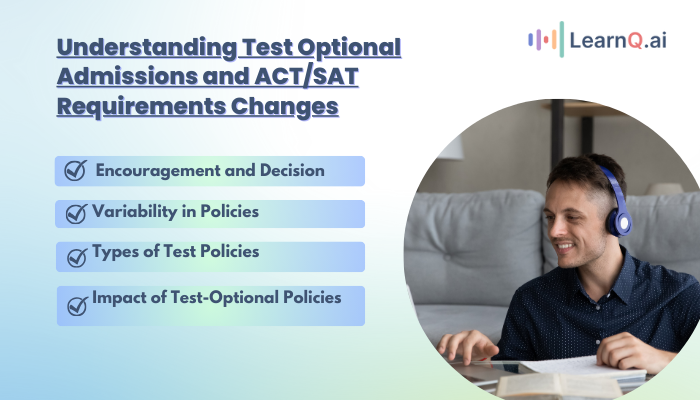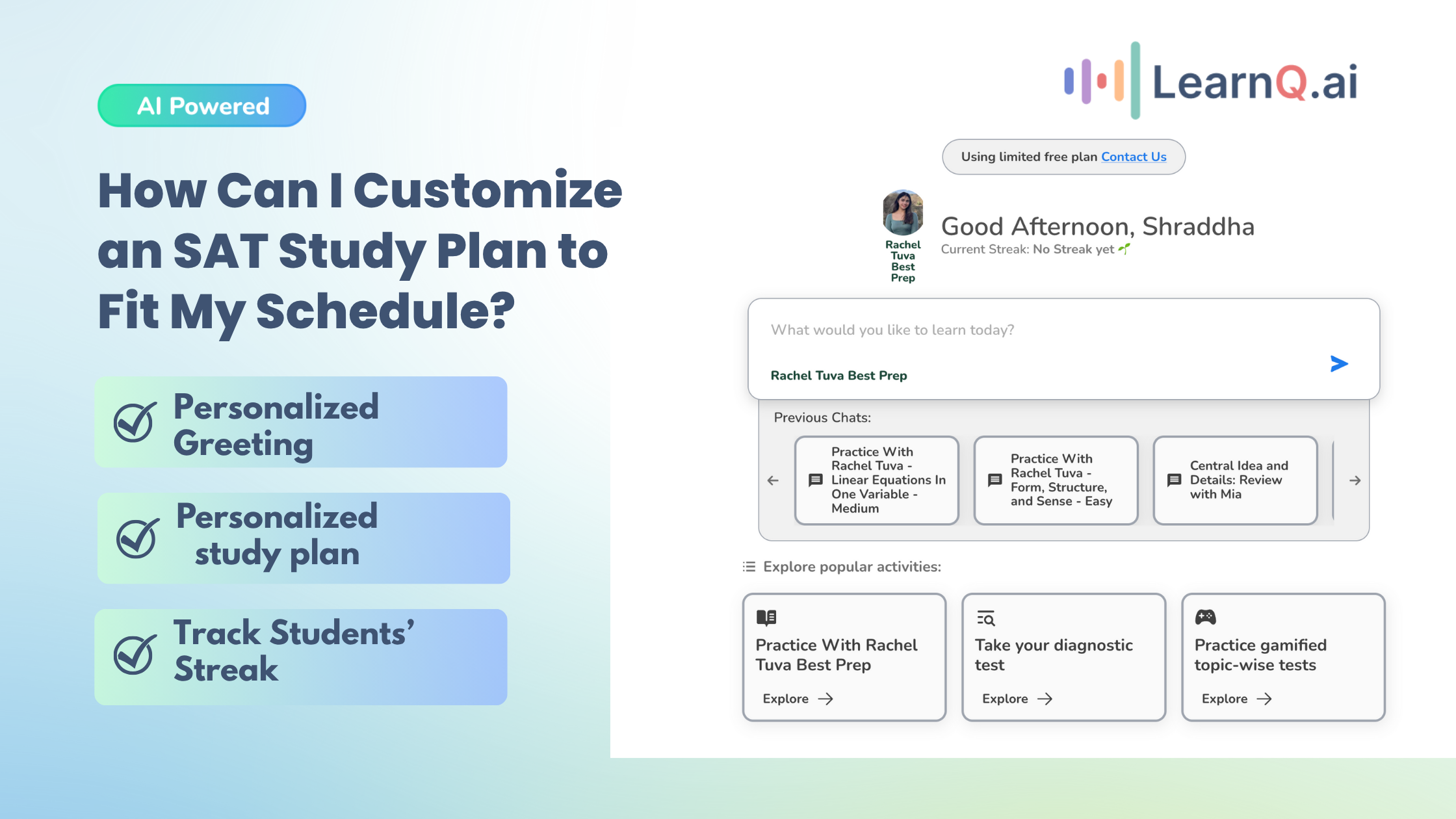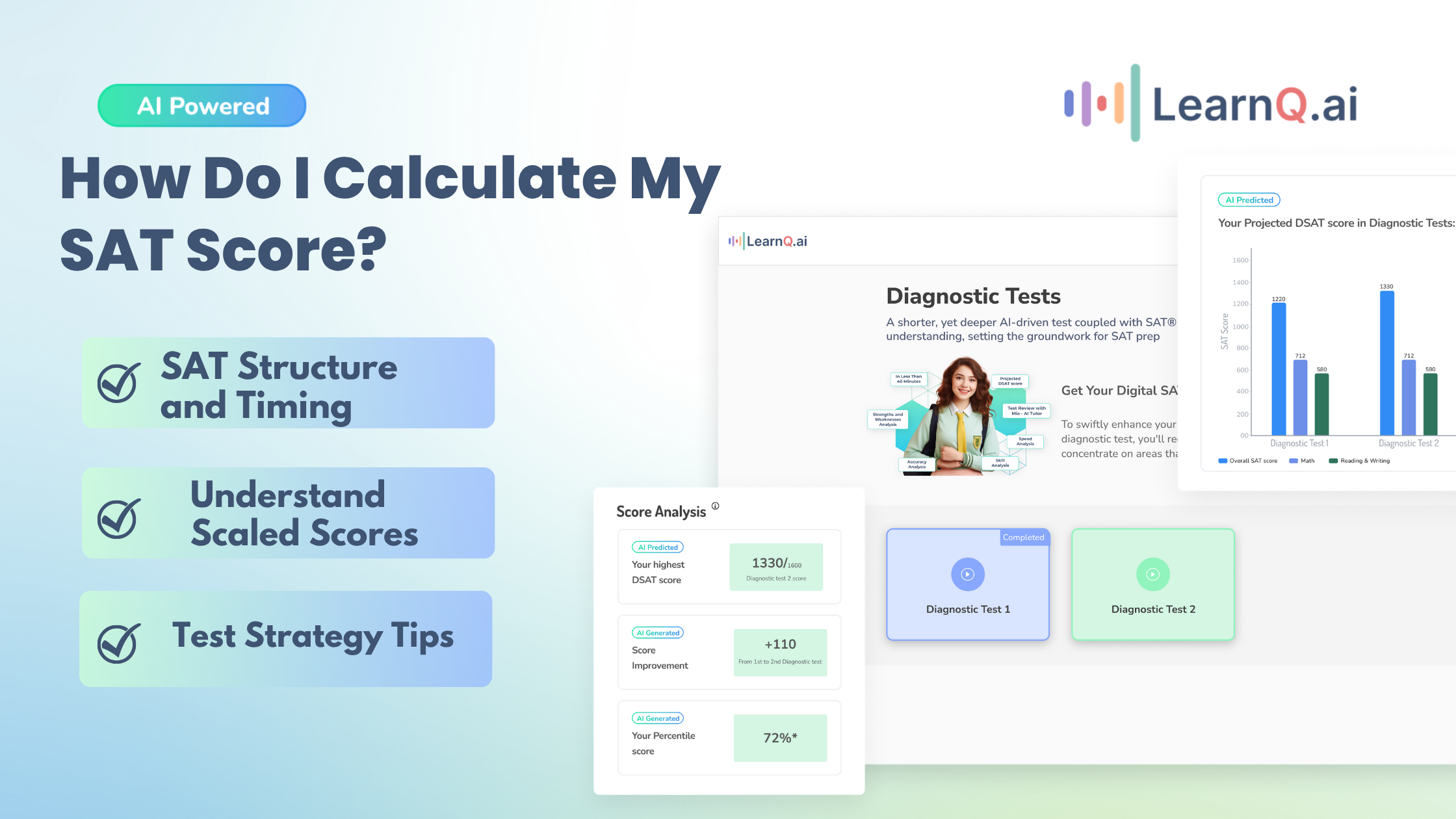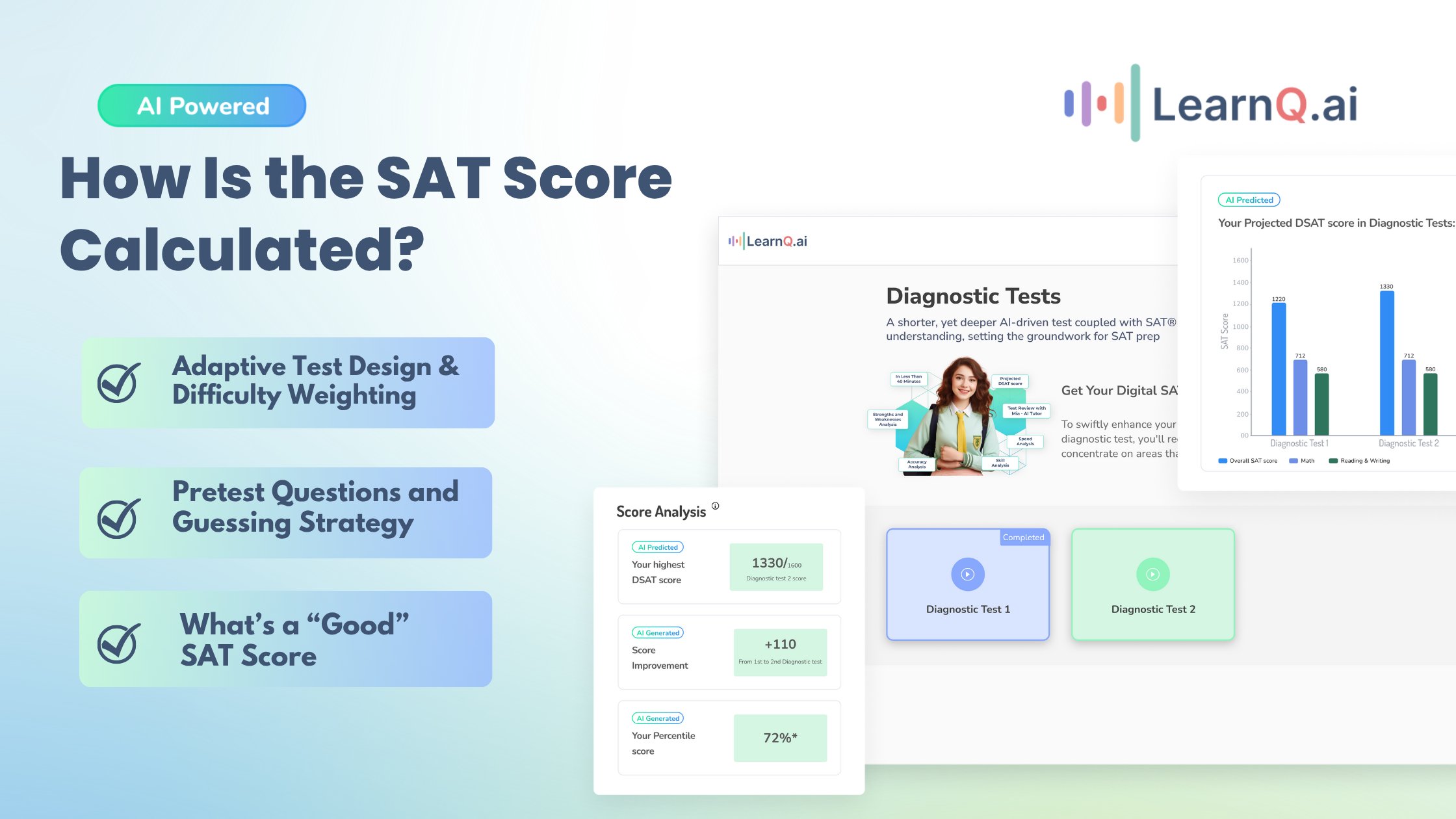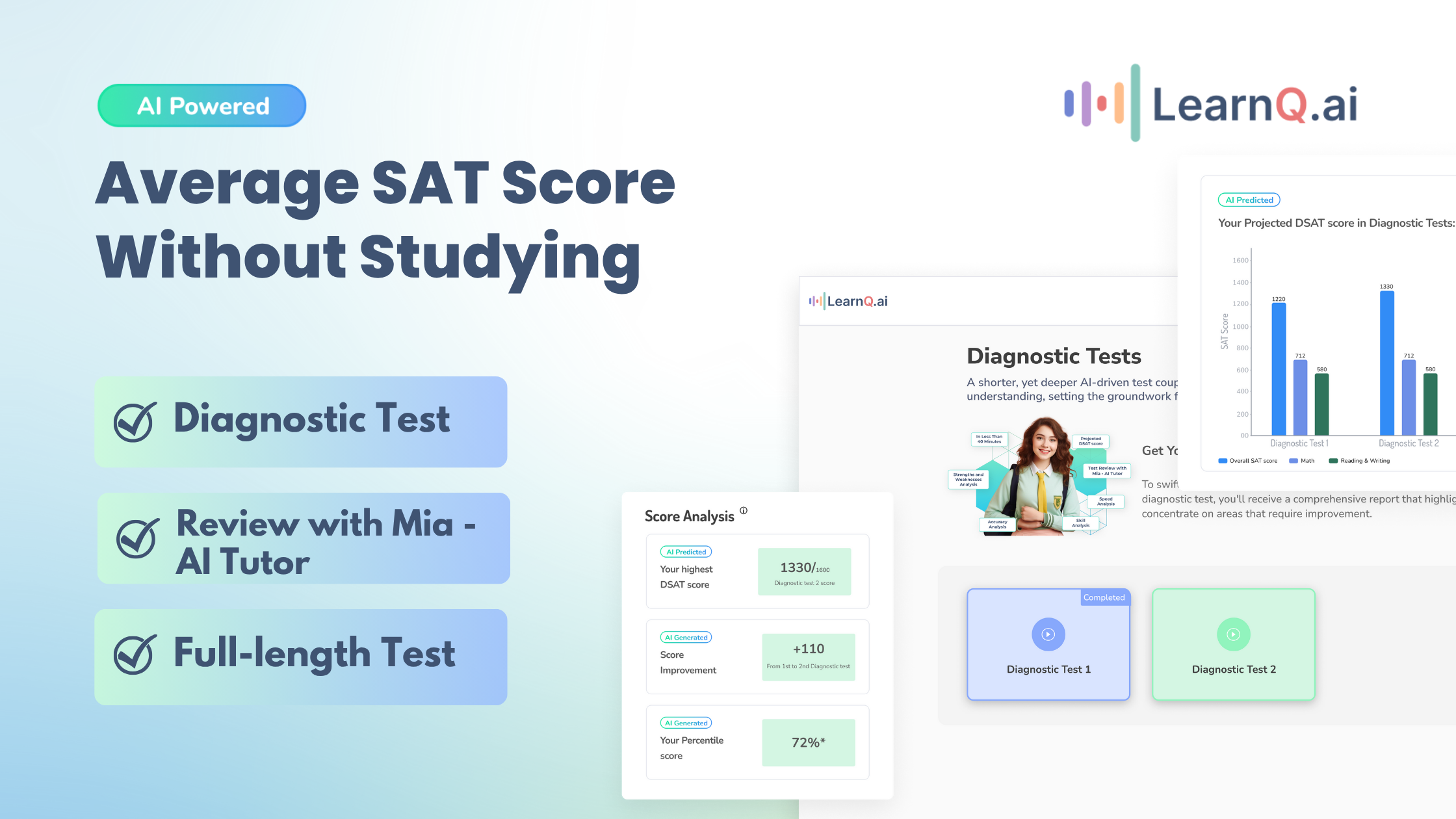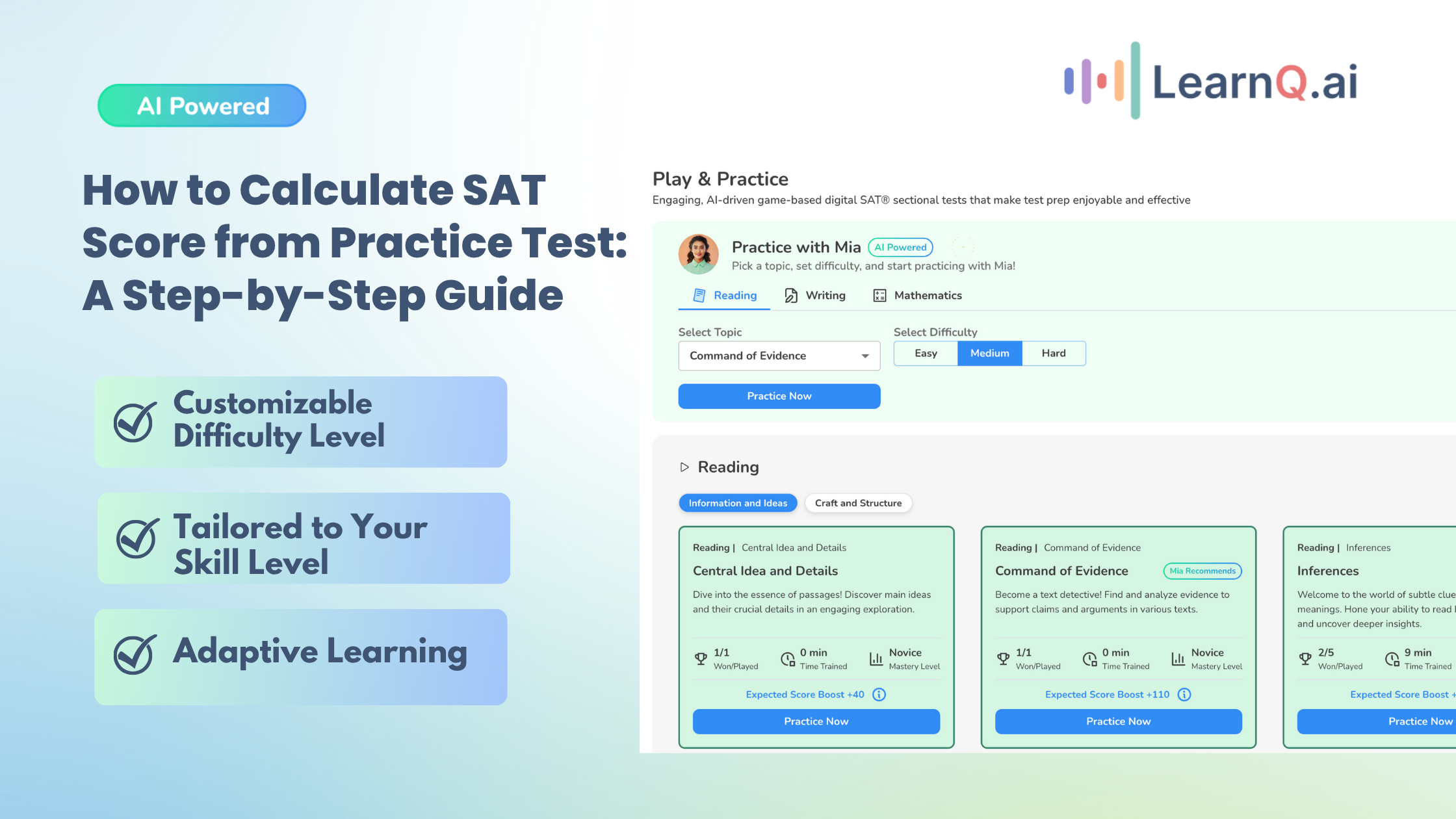College admissions have always been a stressful ride, and now, they’re more unpredictable than ever. If you’re a student—or a parent of one—facing the question of standardized testing, you know the SAT and ACT have seen some significant changes in recent years. What used to be a non-negotiable part of your college application has now become, well, a bit of a wild card. So, what does that mean for you?
Let’s cut through the confusion. More and more colleges are switching to test optional admissions, test-flexible, or even test-blind policies. These shifts mean that for many schools, your test scores may no longer make or break your application. But—and this is a big but—whether you should still take these tests and submit your scores isn’t a one-size-fits-all answer.
Here’s where LearnQ comes in. In this rapidly changing world of test optional admissions, LearnQ helps you make smart, personalized decisions. Using AI-powered study plans and diagnostic assessments, the platform gives you a clear sense of your strengths and areas to improve. Whether you decide to embrace the test-optional trend or aim for a perfect score, LearnQ has you covered.
LearnQ.ai is Powered by VEGA AI—Is your Institute Next?
Give students a Duolingo-style test-prep platform with Shopify-level customization for tutors and institutes.
In this article, we’ll break down the different types of testing policies, how they affect your admissions strategy, and how LearnQ can support your journey.
Ready to make sense of it all? Let’s get started.
Understanding test optional admissions
So, what exactly is test optional admissions, and why has it become so widespread? In short, test optional admissions policies give you the flexibility to decide whether or not to include your SAT or ACT scores in your application. This shift aims to make college admissions more accessible and fair, mainly as concerns about standardized testing have grown.
Here’s a breakdown of what you need to know:
- What It Means: You can choose to submit your test scores if they strengthen your application. If you’re not happy with your scores, you can skip them, and your application will still be reviewed without any disadvantage.
- Why It’s Popular: The pandemic highlighted accessibility issues with testing. Still, even before that, critics argued that standardized tests can be biased and don’t always predict college success or high school GPA.
- Who Benefits: Students who excel in other areas, such as grades, extracurricular activities, or personal essays, might find that a test-optional policy benefits them.
- When to Submit Scores: If your scores are strong and place you in the top range for your target colleges, submitting them can only help. Otherwise, you might focus on showcasing your strengths in other parts of your application.
- How LearnQ Helps: LearnQ provides personalized tools and resources to guide you. You’ll get data-driven insights on whether submitting your scores will make a difference and what areas to improve on if you choose to take the tests.
With LearnQ’s support, you can confidently navigate these changes and build a strong application, whether you choose the test-optional route or showcase your scores.
Encouragement and Decision
Deciding whether to submit your test scores is not always clear-cut. You might feel stuck, wondering if you should take advantage of the test optional admissions policy or send in your SAT or ACT scores. The good news is that this choice gives you some control over how you present yourself to colleges. But how do you know what’s best for you?
First, think about your academic profile. Are your grades, coursework, and extracurriculars strong? If so, going test-optional might make sense. On the other hand, if you have a solid test score that could strengthen your application, submitting it could give you a competitive edge. Here’s how to break it down:
- Assess Your Strengths: Take a good look at your GPA, academic achievements, and other standout factors. If these areas already paint a strong picture, you may not need to worry about your test scores.
- Consider Your Target Schools: Check the average scores for accepted students. If your scores are above the median, they could boost your application. If they’re below, you might be better off focusing on other strengths.
- Evaluate Your Effort and Investment: Preparing for these tests takes time and resources. If you’re confident your scores will reflect your abilities well, it could be worth the investment. Otherwise, focusing on other aspects of your application might be more brilliant.
- Think About Scholarships: Remember that some merit-based scholarships still require SAT or ACT scores. If financial aid is a factor, don’t overlook this detail.
Also Read: Know Everything About Digital SAT and PSAT/NMSQT Assessments
Variability in Policies
When it comes to test optional admissions, one thing is clear: not all colleges treat these policies the same way. It’s easy to assume that “test-optional” means you have the same choice everywhere, but that’s far from the truth. Different schools have different rules, and it’s essential to understand what they are before you make any big decisions.
- Fully Test-Optional
Some colleges are completely test-optional. This means you get to decide if you want to send your SAT or ACT scores, and your application won’t suffer if you choose to leave them out. It’s all about how you feel your scores represent your potential.
- Test-Optional with Exceptions
Things get a bit more complicated here. Some schools still require test scores for specific groups of students. For example, if you’re an international student, double-check the rules because you might still need to submit your scores. Also, specific programs—like engineering, nursing, or other specialized fields—might have their testing requirements, even if the rest of the school doesn’t.
- Test-Flexible Policies
Then there are colleges with test-flexible options. Instead of the SAT or ACT, these schools let you submit other types of assessments, like AP exams, IB scores, or placement tests. It gives you some alternatives, but you need to be sure that whatever you’re submitting meets their criteria.
- Test-Blind Institutions
Finally, some colleges have taken things a step further. Test-blind schools won’t look at your scores at all, even if you send them. Here, your academic record, essays, extracurricular activities, and letters of recommendation carry a lot more weight in the admissions process.
- Why It Matters
You might be thinking, “Why is this so important?” Because understanding these policies helps you make intelligent choices. If you’re aiming for a school with strict requirements for your primary or your status as an international student, you don’t want to get caught off guard. On the flip side, if a school is genuinely test-blind, you can focus all your energy on other parts of your application.
Also Read: Report SAT Essay On Common App & Combining Them.
Enhance your Digital SAT study routine with AI-driven insights and personalized practice tests.
Types of Test Policies
Understanding the different types of test policies can save you from last-minute surprises and help you feel more in control of your college application process. Let’s break down the main ones you’ll come across.
- Test-Optional
When a college says it’s test-optional, it’s giving you a choice. You can submit your SAT or ACT scores if you think they’ll add something valuable to your application. If your scores are impressive and reflect your academic ability, sending them in could be a good idea. But if your scores don’t paint the best picture of your potential, you can skip them without hurting your chances. Your grades, extracurriculars, essays, and letters of recommendation will get the full spotlight.
- Test-Flexible
This policy offers a bit more wiggle room. Test-flexible schools allow you to submit different types of scores, like AP exam results, IB scores, or even SAT Subject Tests, as alternatives to the SAT or ACT. It’s still essential to check exactly what each college accepts. Some might have strict rules about which alternative scores qualify, so double-checking is always a smart move.
- Test-Blind
Test-blind is the most straightforward of the bunch. If a school says it’s test-blind, it means they won’t consider your test scores at all—even if you send them. Your scores won’t be part of the conversation, period. In this case, the weight falls heavily on your GPA, course load, essays, recommendations, and extracurricular involvement. It’s a chance to highlight every other part of your application.
- Additional Uses for Test Scores
Even if a school is test-optional, your SAT or ACT scores still matter for other reasons. Some colleges use them for scholarship eligibility or for placing you in suitable classes once you’re admitted. If you’re hoping for merit-based aid, it’s worth checking if a strong test score could give you an edge. The same goes for math or language placement tests, which could make your college experience a little smoother.
For a strategic approach to test optional admissions, LearnQ.ai provides everything you need to make informed choices and feel confident. With adaptive practice tests and personalized support from Mia, your AI tutor, you’ll be equipped to maximize your SAT performance if you choose to submit scores—or focus on strengthening other areas of your application. Let LearnQ.ai be your partner in navigating these changes and preparing for college success.
Also Read: Comparing Difficulty: Real SAT vs Practice Tests.
Recent Changes in Standardized Testing Requirements
Standardized testing has gone through a lot of shifts recently, and if you’ve been keeping up, you know the pandemic had a significant role in this transformation. Before COVID-19, most colleges still required SAT or ACT scores. Then, everything changed almost overnight. Test centers closed, students couldn’t sit for exams, and colleges had to rethink their policies.
COVID-19 Impact
The pandemic forced colleges to adapt quickly, and many of them decided to make testing optional. What started as a temporary change ended up transforming the admissions world. More schools began to realize that high school GPA and coursework could be just as if not more, important indicators of a student’s potential. Suddenly, test-optional policies became more than just a short-term fix—they started to stick around.
Reversion to Requirements
Now, as things begin to settle back to normal, some schools have chosen to return to their previous testing requirements. A few high-profile institutions have reinstated the SAT and ACT as mandatory parts of the application. Their reasoning? They believe standardized tests provide an additional layer of data that helps with admissions decisions, especially when comparing students from different educational backgrounds. But this isn’t happening everywhere, and the debate over the value of standardized testing is far from over.
Why It’s a Mixed Bag
These shifts have created a lot of uncertainty. Some argue that test-optional policies help level the playing field, especially for students who don’t have access to expensive test prep resources. Critics of standardized tests point to issues of inequality, saying these exams favor wealthier students who can afford more preparation. On the flip side, supporters argue that standardized tests offer a uniform way to assess students, no matter where they come from.
Arguments for and Against Standardized Tests
Standardized testing is one of those topics that always spark debate. Some people swear by it, while others believe it does more harm than good. Let’s break down both sides so you can understand what’s really at stake.
Benefits of Standardized Tests
Supporters of standardized tests say they offer a level playing field, providing colleges with a consistent way to evaluate students from different backgrounds. Here’s why some see these tests as valuable:
- Standard Measure: They give schools a way to compare students using the same criteria, regardless of where they’re from.
- Highlight Strengths: For students with lower GPAs, a strong test score can balance their academic profile.
- Merit-Based Aid: Many scholarships and financial aid packages still rely on test scores for eligibility.
Criticism of Standardized Tests
Critics argue that these tests create barriers for students from underprivileged backgrounds and don’t always reflect a student’s true abilities. Here are the main concerns:
- Access Inequality: Wealthier students often have access to better prep resources, giving them an unfair advantage.
- Test Anxiety: High-stakes exams can disproportionately hurt students who experience severe anxiety, affecting their performance.
- Questionable Predictive Value: Studies suggest that high school GPA is often a better indicator of college success than test scores.
Where Do You Stand?
There are valid points on both sides. If you’re trying to decide whether to take these tests, consider your situation. Are you confident that a strong score will boost your application? Or do you think your grades and extracurriculars will make a stronger impression? There’s no one correct answer, but understanding both perspectives can help you make the best decision for your future.
Impact of Test-Optional Policies on Admissions
Test optional admissions have had a significant impact on the college admissions process, reshaping how schools evaluate applicants and influencing student demographics. Here’s how these changes have played out:
Student Diversity
- Increased Access: More applications from underrepresented groups, as the pressure of test scores is removed.
- More excellent Opportunity: Students from lower-income families or those who couldn’t afford expensive test prep now have a better shot at competitive schools.
- Ongoing Debate: Some critics argue that even with test-optional policies, inequalities persist, as students who submit high scores may still have an edge.
Admissions Complexity
- Holistic Review: Colleges are placing more weight on essays, extracurricular activities, recommendations, and high school performance.
- More Time-Intensive: Admissions officers must spend more time evaluating the full scope of an applicant’s achievements and potential.
- Heightened Importance of Essays and Extracurriculars: With test scores being optional, your story, impact, and involvement outside of academics are more crucial than ever.
Enhance your Digital SAT study routine with AI-driven insights and personalized practice tests.
Considerations for Students
Deciding whether to submit your test scores under test optional admissions can feel tricky, but breaking it down can make a choice more straightforward. Here are some key factors to think about:
- Evaluate Your Scores: If your scores are at or above the average for your target schools, submitting them under test optional admissions could strengthen your application. If they fall below, you should rely on your GPA and other achievements.
- Academic Strengths: Consider how your grades, course rigor, and extracurriculars stack up. If these areas shine, skipping the test scores could still keep you competitive.
- Personal Confidence: Think about how comfortable you feel with your scores representing your academic ability. If you’re unsure, it may be worth focusing on other parts of your application.
- Merit Scholarships: Remember that some scholarships still require test scores. If financial aid is a priority, check the criteria to ensure you’re not missing out on opportunities.
- Overall Application Balance: Your essays, recommendations, and activities become even more critical if you choose not to submit test scores. Make sure these elements tell a solid and cohesive story about who you are.
Future Trends in Test-Optional Policies
The college admissions world is still shifting, and test optional admissions are at the center of these changes. Here’s what to keep an eye on as policies continue to evolve:
- Permanent Test-Optional Policies: Many colleges are making test optional admissions a permanent feature, moving away from standardized tests to emphasize other elements of a student’s profile.
- Focus on Holistic Admissions: With test scores carrying less weight, schools are diving deeper into applicants’ high school performance, essays, extracurriculars, and recommendation letters. Your overall story and impact are becoming more critical.
- Rise of Test-Blind Institutions: Some schools are going even further by adopting test-blind policies, where test scores aren’t considered at all. This trend could continue as more institutions aim to make admissions processes more equitable.
- Impact on Application Numbers: As more schools stay test-optional, the number of applications continues to rise, making the admissions process even more competitive.
- Greater Emphasis on Essays and Activities: Without the focus on test scores, your written personal statement and meaningful activities will carry more weight, showcasing your character and unique contributions.
LearnQ.ai is powered by VEGA AI—Is your institute next?
Offer students a Duolingo-style test-prep platform with Shopify-level customization for tutors and institutes.






Conclusion
When it comes to test optional admissions, there’s a lot to think about. It’s not just about whether you submit your scores or not; it’s about understanding how every piece of your application works together. This changing admissions world gives you more choices, but it also means you need to be strategic.
Think about your strengths. Your GPA and extracurriculars speak for themselves, and skipping the tests makes sense. Your test scores also show your academic ability in a way that gives you an extra boost. Whatever you decide, make sure it’s a choice that reflects who you are as a student.
Keep in mind that colleges are placing a more significant emphasis on your overall story. Your essays, recommendations, and activities are carrying more weight than ever. So, take the time to show colleges what you bring to the table beyond test scores.
In the end, the goal is to present your best self. Stay informed, do your homework on each school’s policies, and be confident in how you build your application. This is your journey, and you have the tools to make it a strong one.
Ready to take your SAT preparation to the next level? Join other SAT students on Discord to connect with peers and access extra support. Start by taking LearnQ.ai’s free diagnostic tests to pinpoint your strengths and areas for growth. With LearnQ.ai, you’ll prepare strategically and show colleges more than just a test score. Get started today and embrace a well-rounded approach to your college application journey.

